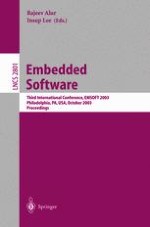2003 | OriginalPaper | Buchkapitel
Resource Interfaces
verfasst von : Arindam Chakrabarti, Luca de Alfaro, Thomas A. Henzinger, Mariëlle Stoelinga
Erschienen in: Embedded Software
Verlag: Springer Berlin Heidelberg
Enthalten in: Professional Book Archive
Aktivieren Sie unsere intelligente Suche, um passende Fachinhalte oder Patente zu finden.
Wählen Sie Textabschnitte aus um mit Künstlicher Intelligenz passenden Patente zu finden. powered by
Markieren Sie Textabschnitte, um KI-gestützt weitere passende Inhalte zu finden. powered by
We present a formalism for specifying component interfaces that expose component requirements on limited resources. The formalism permits an algorithmic check if two or more components, when put together, exceed the available resources. Moreover, the formalism can be used to compute the quantity of resources necessary for satisfying the requirements of a collection of components. The formalism can be instantiated in several ways. For example, several components may draw power from the same source. Then, the formalism supports compatibility checks such as: can two components, when put together, achieve their tasks without ever exceeding the available amount of peak power? or, can they achieve their tasks by using no more than the initially available amount of energy (i.e., power accumulated over time)? The corresponding quantitative questions that our algorithms answer are the following: what is the amount of peak power needed for two components to be put together? what is the corresponding amount of initial energy? To solve these questions, we model interfaces with resource requirements as games with quantitative objectives. The games are played on state spaces where each state is labeled by a number (representing, e.g., power consumption), and a play produces an infinite path of labels. The objective may be, for example, to minimize the largest label that occurs during a play. We illustrate our approach by modeling compatibility questions for the components of robot control software, and of wireless sensor networks.
